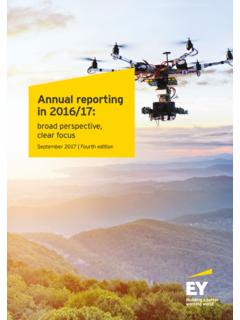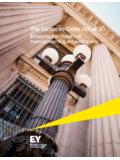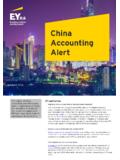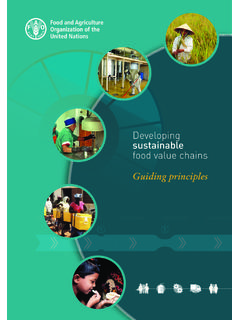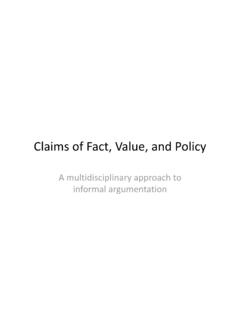Transcription of Value of sustainability reporting - EY
1 Value of sustainabilityreportingA study by EY and Boston CollegeCenter for Corporate CitizenshipAbout this studyThis study was produced as a joint effort betweenEY and the Center for Corporate Citizenship atBoston Boston College Center for Corporate Citizenshipand Ernst & Young LLP conducted a survey onsustainability reporting , which was administeredbetween February 26 and March 8, 2013. Thecomprehensive survey covered various aspects ofan organization s ESG reporting . Topics included thecost and benefits of reporting , as well as makingconnections to financial performance. Respondents companies did not have to report in order toparticipate in the survey. For more information onthe profiles of the companies surveyed and themethodology, please refer to page of contentsExecutive summary.
2 2 The Global reporting Initiative:the leading global standard ..4 History of the GRI and sustainability reporting .. 5 sustainability reports: yesterday and today ..6It s just part of business: reasons to report .. 7 reporting contributes to important business outcomes .. 8 Investors and exchanges seeking more transparency .. 10 reporting : the law of the land? .. 10 The business benefits of sustainability reports ..12 Financial performance .. 12 Access to capital .. 13 Innovation, waste reduction and efficiency .. 13 Risk management .. 14 Reputation and consumer trust .. 14 Employee loyalty and recruitment .. 14 Social benefits .. 14 Why not report? .. 15 The future of sustainability reporting .
3 16A push to integrate financial and sustainability reporting .. 16 Assurance and harmonization .. 17 Appendix A: harmonization of reporting frameworks ..18 About this study ..24 Profile of organizations surveyed and methodology .. 24 References .. 2612345672 | Value of sustainability reportingExecutive summaryWhere once sustainability disclosure was the province of a fewunusually green or community-oriented companies, today itis a best practice employed by companies worldwide. A focuson sustainability helps organizations manage their social andenvironmental impacts and improve operating effi ciency andnatural resource stewardship, and it remains a vital component ofshareholder, employee, and stakeholder is clear that sustainability reporting is here to stay.
4 Environmental,social and governance (ESG) company data scroll down thousandsof trading terminals. A full 95% of the Global 250 issue Firms continuously seek new ways to improveperformance, protect reputational assets, and win shareholder andstakeholder trust. The evidence is all around benefi ts of sustainability reporting go beyond relating fi rmfi nancial risk and opportunity to performance along ESG dimensionsand establishing license to operate. sustainability disclosurecan serve as a differentiator in competitive industries and fosterinvestor confi dence, trust and employee loyalty. Analysts oftenconsider a company s sustainability disclosures in their assessmentof management quality and effi ciency, and reporting may providefi rms better access to In a review of more than 7,000sustainability reports from around the globe, researchers found thatsustainability disclosures are being used to help analysts determinefi rm values and that sustainability disclosures may reduce forecastinaccuracy by roughly 10%.
5 3 Beyond the Global 250, thousands of companies around the worldissue sustainability reports, and the number of companies reportinggrows every In 2011, more than 2,200 fi rms fi led reportswith the Global reporting Initiative (GRI), and hundreds morefi led GRI-referenced These fi rms exemplify the principlethat reporting is expected of the top companies in our modernbusiness world. As business consultant and author ChristopherMeyer explained, we now live in the age of transparency, wherecompanies that do not own up to their responsibilities will fi ndthemselves in the worst of all worlds, where they will bemaderesponsible and still not be considered responsible. 6 sustainability reporting hasemerged as a common practice of21st-century study by EY and the Boston College Center for Corporate Citizenship| 3 The benefi ts of reporting include: Better reputation:a 2011 survey on corporate reputationfound that expanding transparency and reporting positivedeeds were the two most important ways to build public trustin The 2013 Boston College Center for CorporateCitizenship and EY survey revealed that more than 50% ofrespondents issuing sustainability reports reported that thosereports helped improve fi rm reputation (see Figure 1).
6 Meeting the expectations of employees: a 2011 surveyconducted by EY and Green Biz found that employees werea vital audience for sustainability reporting , with 18% ofreporters citing employees as a report s primary than 30% of reporters in the 2013 Boston CollegeCenter for Corporate Citizenship and EY survey saw increasedemployee loyalty as a result of issuinga report (see Figure 1). Improved access to capital: recent research found thatreporting fi rms ranked highly for sustainability have Kaplan-Zingales Index scores that are lower than the scores forlow- sustainability A lower score signifi es fewercapital constraints. Increased effi ciency and waste reduction: in a 2012 globalsurvey of sustainability reporters, 88% indicated that reportinghelped make their organizations decision-making processesmore effi reporting requires companies to gatherinformation about processes and impacts that they may not havemeasured before.
7 This new data, in addition to creating greatertransparency about fi rm performance, can provide fi rms withknowledge necessary to reduce their use of natural resources,increase effi ciency and improve their operational addition, sustainability reporting can prepare fi rms to avoid ormitigate environmental and social risks that might have materialfi nancial impacts on their business while delivering betterbusiness, social, environmental and fi nancial Value creating avirtuous , 61% of sustainability managers report that riskmanagement is one of the three top reasons for their fi rms sustainability The links between material businessimpacts and environmental and social risks suggest thatsustainable business management and its key metrics willbecome more signifi cant in the evaluation of overallbusiness reporting to be as useful as possible for managers,executives, analysts, shareholders and stakeholders, a unifi edstandard that allows reports to be quickly assessed, fairlyjudged and simply compared is a critical asset.
8 The GlobalReporting Initiative (GRI) currently provides the global standardfor comparability. benefi ts of reporting include:Figure 1: Ways that sustainability reporting provided valueSource: Boston College Center for Corporate Citizenship andEY 2013 surveyNote: for information on how this study was conducted,please refer to page | Value of sustainability reportingThe Global ReportingInitiative: the leadingglobal standardMore thantwo-thirdsof respondents indicate that theirorganizations employ the GRIframework in the preparation oftheir fi rms worldwide have embraced sustainability reporting , the most widelyadopted framework has been the GRI sustainability reporting Framework(GRI Framework or framework).
9 The GRI framework is a collection of reporting guidance documents all ofwhich were developed through global, multi-stakeholder consultativeprocesses designed to assist companies in preparing sustainability reports andESG disclosures. These guidance documents are periodically revised to ensurethat they continue to meet the needs of 21st-century business and the 2013 Boston College Center for Corporate Citizenship and EY survey onsustainability reporting , more than two-thirds of respondents indicate that theirorganizations employ the GRI framework in the preparation oftheir key benefi t of using the GRI framework, in addition to standardizationof reports, is guidance on material issues.
10 The GRI emphasizes that acompany consider those environmental and social aspects that are mostsignifi cant to its key stakeholders and have the most signifi cant impacts on itsbusiness or result from GRI Guidelines have been designed to harmonize with other prominentsustainability standards, including the OECD Guidelines for MultinationalOrganizations, ISO 26000 and the UN Global who use the GRI Guidelines are strongly encouraged to submit theirsustainability reports to external assurance. Though assurance is not mandatoryfor sustainability reports, there is evidence that many analysts and investors,including investors who do not consider themselves social investors, considerassurance important and factor its presence or absence into their As one respondent to the Boston College Center for CorporateCitizenship and EY 2013 survey wrote: We are investors who are looking forrobust material and audited sustainability information for corporations.


